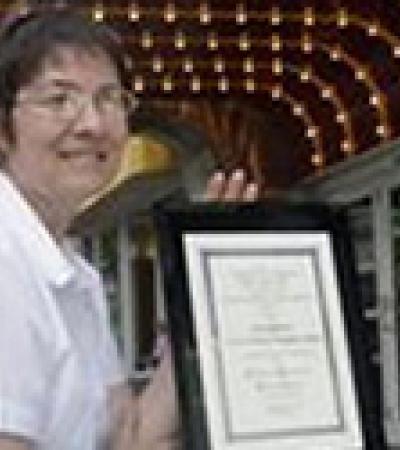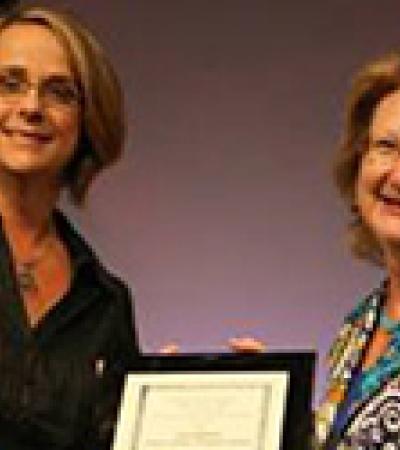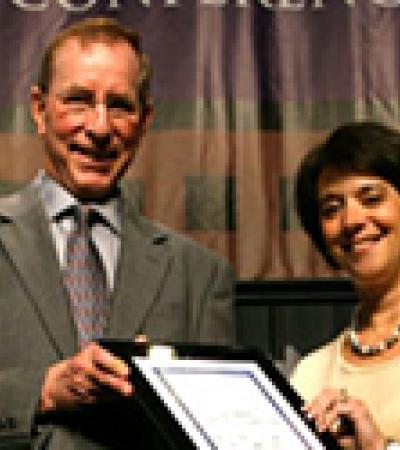Editor’s note: Today’s post is part of a month-long series featuring Q&A with past winners of the Sara Jaffarian School Library Program Award for Exemplary Humanities Programming.
The Sara Jaffarian Award was established in 2006 to recognize and promote excellence in humanities programming in elementary and middle school (K–8) libraries. It is presented annually by the Public Programs Office, in cooperation with the American Association of School Librarians (AASL), and named for Sara Jaffarian, whose donation to ALA’s Cultural Communities Fund established the award. Jaffarian, a retired school librarian and long-time ALA member, spent her career passionately advocating for school libraries in every school. Find out more about the Sara Jaffarian award. Applications for the 2011 Jaffarian Award will be accepted September 1, 2010–December 15, 2010.
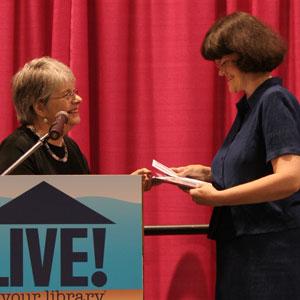
Sandra Wiseman is the School Library Media Specialist at Woodsdale Elementary School in Wheeling, West Virginia. Her program, History Hits the Road to Woodsdale, won the 2008 Jaffarian Award.
Programming Librarian: Please briefly describe your school library’s humanities program. Why did you decide to put the program up for consideration for the Jaffarian Award?
Sandra Wiseman: We received our award for a program called History Hits the Road to Woodsdale. Historical re-enactors spent the day at school providing 1800s hands on activities for our students. They ground corn, spun wool, marbled paper, and visited an authentic covered wagon. In the evening we held a family program that included snacks and candle dipping. I was searching the internet for grant opportunities and ran across the Sara Jaffarian application. I read through the requirements and thought our program fit them perfectly. I thought the questions were reasonable and would not take a big time commitment to complete.
PL: What were some challenges that you encountered during your library’s humanities program? How did you overcome them?
SW: Funding for this project came from three sources: the school’s general fund, the PTA, and from the WV Humanities Council. Balancing the money to meet all of our expenses took some work. We had to apply to the Humanities Council for the funding with no guarantee that we would receive what we were asking for. We had to sign a contract with History Hits the Road prior to knowing if all of the funding would come through. We had to hope for the best, and fortunately everything worked out. We would have had to look for another donor if we were denied the grant. We also had a little trouble contacting the History Hits the Road staff to work out all of the details because they were traveling a lot and giving many programs around the state. We sent communications early and often and in a variety of formats (email, office phone, cell phone, etc.)
PL: What do you think set your program apart from all the other 2008 Jaffarian applicants?
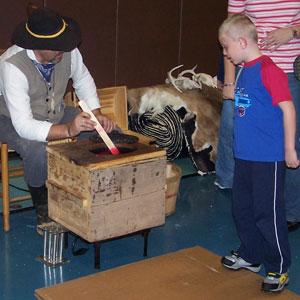
SW: I think the fact that we worked with many different agencies to make our program successful set us apart. The Cooperative Extension Service helped us identify the History Hits the Road scholars. The teachers at every grade level planned special activities to extend the learning and provide memorable experiences for our children. We worked the PTA, the principal, and the Humanities Council to fund the project. This was truly a community effort and I tried to stress this in our application. I also think the fact that we provided hands-on programming during the day for students and then provided activities for the children and their parents in the evening probably set us apart also.
PL: How does your school library plan to use the $4,000 award?
SW: The money was used to buy library books and computer equipment and to fund a return visit with the History Hits the Road scholars for our students.
PL: Do you have any advice for prospective Jaffarian Award applicants?
SW: The tricky thing about this award is that you apply the school year after the program takes place. It is important that the applicant stay very organized and keep copies of all of the paperwork involved (applications, schedules, flyers, photographs, etc.) It is also important to identify and remember key people who were actively involved in making the project successful. You will need them to write letters in support of the application. If you don’t recognize who these people are during the time the program is actually taking place, you won’t be able identify them a year later.

